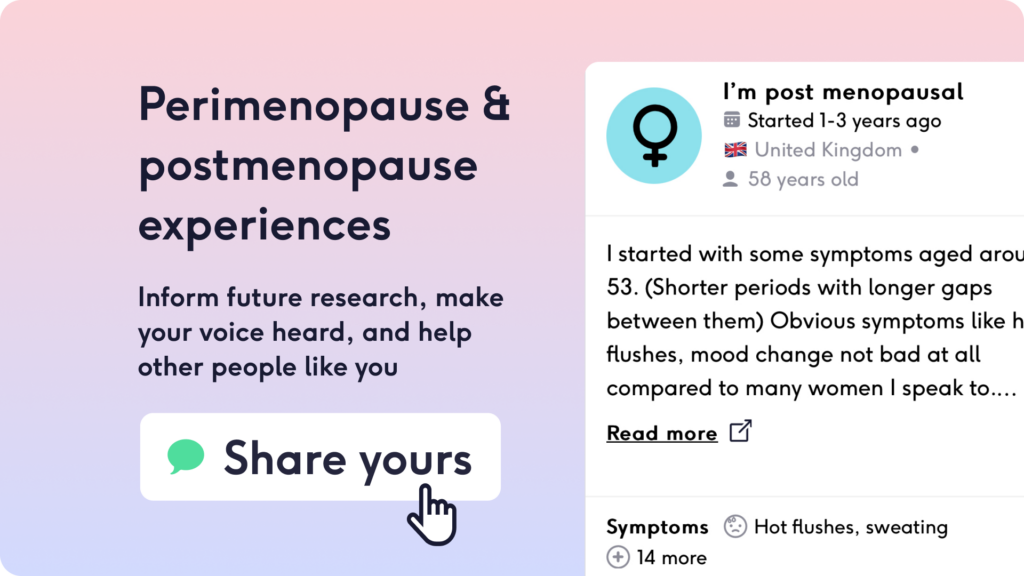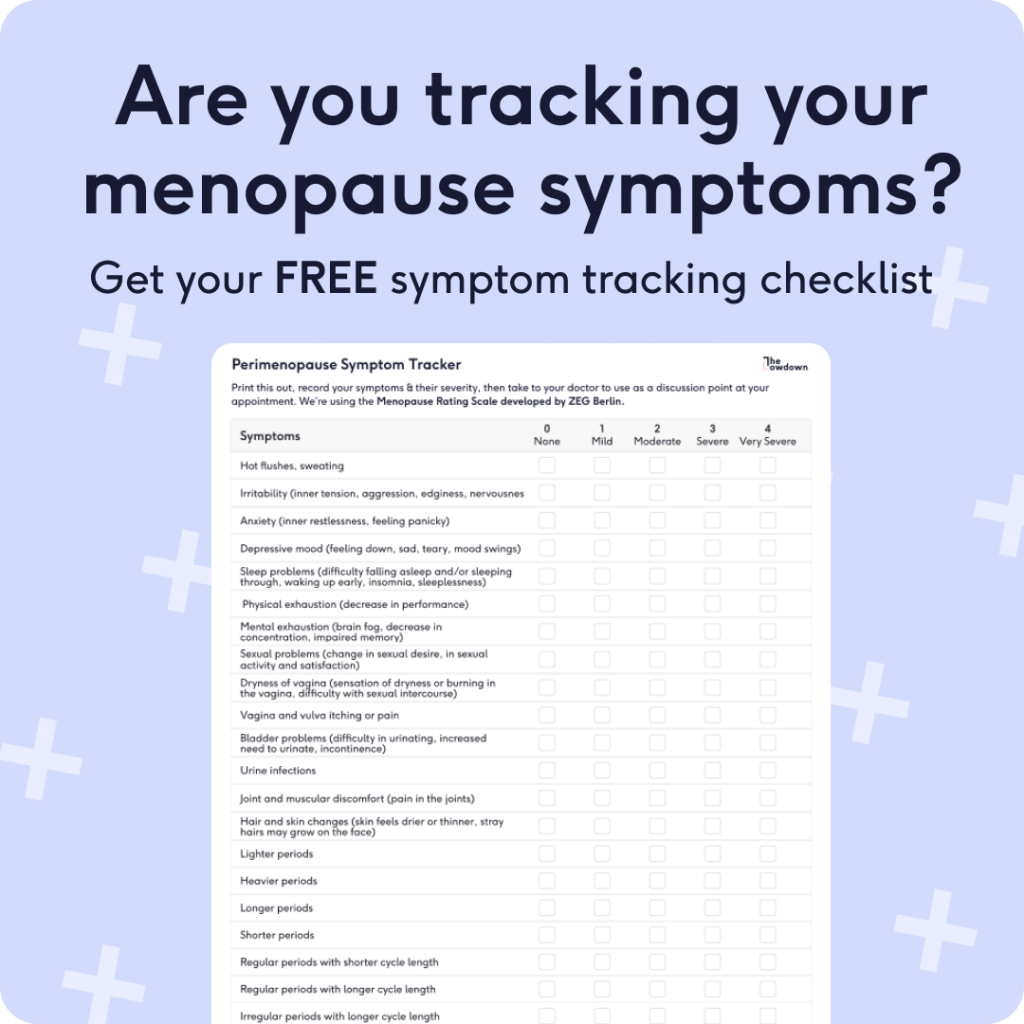
Anxious, exhausted and struggling to focus? It could be perimenopause
Disclaimer: This article is sponsored by MPowder , but just like all of our other content, this is a completely honest breakdown. See our Content Policy for more details.
Did you know that up to 69% of us are likely to struggle with anxiety or depression at some point in our menopause transition¹? Yet, in research undertaken in the UK in 2021, only 12% of us associated anxiety with menopause?²
Anxiety appears to be an early symptom of perimenopause, hitting many of us in our late 30s and early 40s, sometimes even before your periods change.
It’s the canary in the mine that marks a subtle shift in our hormones and is often accompanied by challenges with cognitive function (aka brain fog) and sleep. Researchers believe that these ‘cluster symptoms’ show up together as a result of the complex interplay between our hormones. I like to think of hormones as an orchestra with over 100 different instruments split into sections. When one section, or even one instrument, is offbeat or out of tune, the whole melody is impacted.
With anxiety, it is likely that it impacts us as our progesterone levels reduce. Progesterone helps to modulate the GABA system in our brain, which is known to impact mood and our ability to achieve rest. In addition, studies have shown that oestrogen production, which also fluctuates and declines across our menopause transition, is linked to our serotonin or ‘happy hormone’ levels too.³
A poor night’s sleep can lead to an increase in cortisol production (a stress hormone)⁴, which is why we may start to find ourselves waking up feeling wired or jittery. Cortisol surges and chronic stress prevents serotonin production⁵, which, amongst a whole raft of associated symptoms and behaviours, affects mood. Poor or disrupted sleep, regardless of hormone fluctuations, impacts our brain’s ability to function optimally and hits our energy levels too.
Finally, testosterone is likely to be declining. Although associated with desire, this clever hormone is also, in part, responsible for our ‘get up and go’ or ‘drive’. When we have less, our energy levels are naturally depleted.

A toolkit for tackling anxiety in midlife
It’s natural to feel frustrated by our bodies in midlife. But our biochemistry is phenomenal and, with the right tools and support, it can be a positive opportunity to rethink how we nourish our bodies and minds. Here are our top tips for tackling anxiety, mood and the energy roller coaster holistically:
- Make your GP your friend: We tend to leave speaking to our doctor until the point we’re on our knees. But, if you talk and share how you’re feeling early, not only do you have a clear sense of what medical interventions may be of help, you also have the opportunity to evaluate if you have the right partner for your midlife health, and the time to seek a second opinion should you need. Evidence indicates that Hormone Replacement Therapy may improve mood and anxiety⁶.
- Consider how you digest stress: Our hormones are impacted by external influences⁷ as well as biochemical changes. And menopause often happens at a stage in our lives when we’re juggling multiple life challenges. From ageing parents to growing kids. From climbing that career ladder to rethinking what you may want to do next. There is good evidence supporting the impact of breathwork and regular meditation practice in calming our nervous system. Emotional Freedom Technique (also known as tapping) has a growing body of research supporting its potential too.
- Look at what you put on your plate: Avoid high-sugar foods, processed food and refined carbs – all of which can push up insulin⁸, which can cause inflammation in the brain and alter neurotransmitters and mood.
- Supercharge your nutrition with well-researched herbal heroes: It’s very exciting at this moment in time that the herbs, spices and botanicals used for centuries in traditional medicine practices are finally getting the research investment they need to better quantify their impact. There are so many plants that can support mood, rest, energy and focus.
- Ashwagandha, one of the best-researched adaptogens⁹, has been shown to impact our stress response, reduce anxiety and improve sleep.
- Curcumin, the primary bioactive substance in Turmeric, has been shown to have a positive impact on mood partially through its ability to modulate the neurotransmitters serotonin and dopamine¹⁰. Poorly absorbed on its own, it is best taken with piperine, a Black Pepper extract known to increase its bioavailability.
- Lemon Balm¹¹ is a gentle herb with strong traditional use and can be easily grown in a window box and taken as a tea. Clinical research shows that it can reduce mild-to-moderate anxiety as well as sleep disturbances. Research shows it can also improve mood.
- Make movement a priority: We’re all familiar with the ‘fight or flight’ response and the gear shift our bodies automatically make when they feel threatened. Research shows that movement has a very real impact on our cortisol levels¹² – and, depending on the practice we choose, can help settle our bodies back in ‘rest and digest’ too. The best form of exercise is the form you’ll actually do! But in menopause, it may be that you need to listen in to your body a little. If you suddenly find yourself feeling depleted rather than energised following a regime that has previously served you well, consider exploring new forms of movement too.

To find out more about MPowder’s whole body and mind philosophy for midlife, check out their online journal of blogs. You can also learn more about Mood Food on The Lowdown, MPowder’s sell-out naturopathic formulation specifically designed to target mood, cognitive function and sleep. Find out what The Lowdown doctors think of it, alongside reviews from people who have used it!
Safety notice: Remember, nature packs a powerful punch! Just because herbs are ‘natural’, doesn’t mean they are safe for you. It’s important to do your homework, and to be conscious of both potential contraindications with medication or existing health conditions and to adhere to any recommended time frames for use.


Langade, D. et al. Efficacy and Safety of Ashwagandha (Withania somnifera) Root Extract in Insomnia and Anxiety: A Double-blind, Randomized, Placebo-controlled Study, PubMed (2019)
Chandrasekhar, K. et al. A prospective, randomized double-blind, placebo-controlled study of safety and efficacy of a high-concentration full-spectrum extract of ashwagandha root in reducing stress and anxiety in adults, PubMed (2012)
Choudhary, D. et al. Efficacy and Safety of Ashwagandha (Withania somnifera (L.) Dunal) Root Extract in Improving Memory and Cognitive Functions, PubMed (2017)
Dongre, S. et al. Efficacy and Safety of Ashwagandha (Withania somnifera) Root Extract in Improving Sexual Function in Women: A Pilot Study, PubMed (2015)
Lopresti, A.L. et al. An investigation into the stress-relieving and pharmacological actions of an ashwagandha (Withania somnifera) extract: A randomized, double-blind, placebo-controlled study, PubMed (2019)
Pratte, M. A. et al. An alternative treatment for anxiety: a systematic review of human trial results reported for the Ayurvedic herb ashwagandha (Withania somnifera), PubMed (2014)
10) Lopresti, A.L. and Drummond, P.D. Efficacy of curcumin, and a saffron/curcumin combination for the treatment of major depression: A randomised, double-blind, placebo-controlled study, PubMed (2017)
Yu, J-J. et al. Chronic Supplementation of Curcumin Enhances the Efficacy of Antidepressants in Major Depressive Disorder: A Randomized, Double-Blind, Placebo-Controlled Pilot Study, PubMed (2015)
Esmaily, H. et al. An investigation of the effects of curcumin on anxiety and depression in obese individuals: A randomized controlled trial, PubMed (2015)
Bergman, J. et al. Curcumin as an add-on to antidepressive treatment: a randomized, double-blind, placebo-controlled, pilot clinical study, PubMed (2013)
Kanchanatawan, B. et al. Add-on Treatment with Curcumin Has Antidepressive Effects in Thai Patients with Major Depression: Results of a Randomized Double-Blind Placebo-Controlled Study, PubMed (2018)
Akazawa, N. et al. Curcumin ingestion and exercise training improve vascular endothelial function in postmenopausal women, PubMed (2012)
Sugawara, J. et al. Effect of endurance exercise training and curcumin intake on central arterial hemodynamics in postmenopausal women: pilot study, PubMed (2012)
Panahi, Y. et al. Investigation of the efficacy of adjunctive therapy with bioavailability-boosted curcuminoids in major depressive disorder, PubMed (2015)
Saunmukhani, J. et al. Efficacy and safety of curcumin in major depressive disorder: a randomized controlled trial, PubMed (2014)
Kulkarni, S.K. and Dhir, A. An overview of curcumin in neurological disorders, PubMed (2010)
Ramaholimihaso, T. et al. Curcumin in Depression: Potential Mechanisms of Action and Current Evidence-A Narrative Review, PubMed (2020)
11) Cases, J. et al. Pilot trial of Melissa officinalis L. leaf extract in the treatment of volunteers suffering from mild-to-moderate anxiety disorders and sleep disturbances, PubMed (2011)
Sarris, J. et al. Plant-based medicines for anxiety disorders, part 2: a review of clinical studies with supporting preclinical evidence, PubMed (2013)
Kennedy, D.O. et al. Modulation of mood and cognitive performance following acute administration of Melissa officinalis (lemon balm), PubMed (2002)
Shakeri, A. et al. Melissa officinalis L. – A review of its traditional uses, phytochemistry and pharmacology, PubMed (2016)
Haybar, H. et al. The effects of Melissa officinalis supplementation on depression, anxiety, stress, and sleep disorder in patients with chronic stable angina, PubMed (2018)
12) Nys, L.D. et al. The effects of physical activity on cortisol and sleep: A systematic review and meta-analysis, ScienceDirect (2022)
Our medical review process
This article has been medically reviewed for factual and up to date information by a Lowdown doctor.






